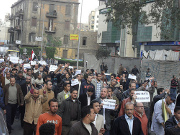 |
| Photo by Ramy Raoof, Demonstrators heading to Tahrir Square in January 2011 |
Egypt (IMB/MNN) ― Egypt's new lower house of parliament just held its first session two days ago, after completing an historic election that put Islamic groups in the legislative lead.
A year ago, Cairo was in turmoil as thousands of angry protesters clashed with government soldiers and tanks.
While the square seems calm, there's an energy that leads Christian worker to note the region's volatility.
Lucy Hamilton (not her real name), with the Southern Baptist International Mission Board says the Arab Spring was the manifestation of the tension in the region. "In Egypt at least, there's a revolution attitude of ‘I can do what I want' because people are disillusioned and desperate, and the police force is unable to keep up with petty crime problems."
The changes in Egypt haven't been as deep as many expected, but they have still made a region-wide impact, says Nik Ripken (not his real name), who has served 25 years with the International Mission Board and is an expert on the persecuted church in Muslim contexts.
"I believe that the Arab Spring and what has happened in Egypt has begun to redefine the Arab if not the entire Muslim world," Ripken says. "What has happened to Mubarak has so terrified the leaders of countries like Yemen and Syria, and of course we saw what played out in Libya -- that no dictator or leader is now willing to participate in a peaceful transition to a more democratic or less corrupt form of government."
The people seem to want something as different as possible from the leadership they've had, Ripken notes, adding that this may mean a more Islamic form of government.
But with this, much like Tahrir Square on its peaceful days, things may not be exactly as they appear, says Ripken. "This is not necessarily a bad thing from a believer's point of view, because having conversations concerning faith and religion are more important for us than conversations about government and corruption." Ripken continues, "Often it is in the most conservative of Muslim hearts that we are finding God appearing to them in dreams and visions and sending them on a spiritual pilgrimage that can last for years, where they secretly read the Bible many times and have quiet discussions with followers of Jesus Christ."
Hamilton says a sense of hopelessness in the government can bring them to Christ, too.
In the light of this, Ripken says, "We want to pray that we will take every opportunity we can to feed the hungry, clothe the naked, give that cold cup of water in Jesus' name. We must pray for the absence of fear for both believers in country and those from the West who are seeking to meet the needs of both the body and soul inside these countries."
Pray that people will have access to the Gospel through any means possible. Ripken concludes with this thought: "Now we have time to prepare the next generation for going to people groups and countries that have experienced massive change."
No comments:
Post a Comment